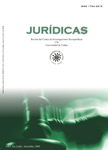Authors
Abstract
Seneca wanted to examine different options for constructing a cosmopolitan ethics, persuaded by the humans’ dependence on the rational spirit which controls this world. In this manner, he wishes to answers the hastiness posed by everyday life. Seneca’s philosophy shows the sense of good actions in accordance to a moral that hopes to achieve happiness. For said purpose, it is necessary that the actions be related to the rational spirit that dominates the natural world. The debate is open regarding later developments for a political theory as a rational law theory in western society.
References
________. (1995). Tecnologías del Yo. Barcelona: Editorial Paidós.
KANT, Immanuel. (1983). Crítica de la Razón Práctica. México: Editorial Porrúa.
LONG, Anthony A. (1977). La filosofía helenística. Madrid: Biblioteca de la Revista de Occidente.
PLATÓN. (1969). Obras Completas. Madrid: Editorial Aguilar.
SÉNECA. (1992a). “La verdadera nobleza está en la filosofía”. En: Tratados filosóficos y cartas. México: Editorial Porrúa.
________. (1992b). “Cartas: El bien único es lo honesto”. En: Tratados filosóficos y cartas. México: Editorial Porrúa.

 PDF (Español)
PDF (Español)
 FLIP
FLIP





















